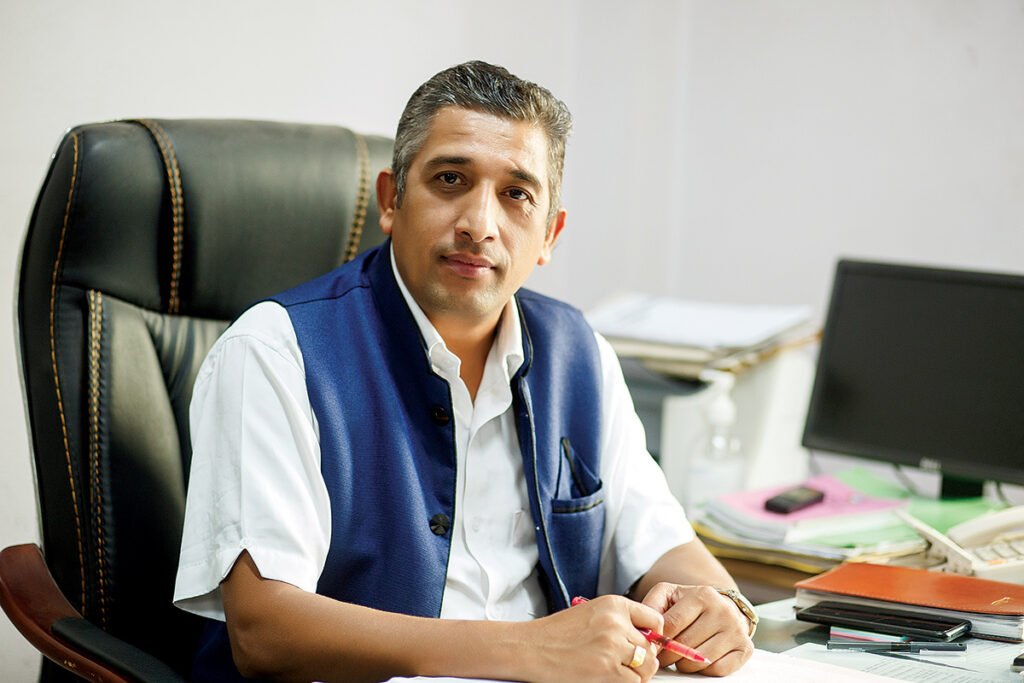
Since early 2000, there has been an increase in the volume of Nepal’s labour migration mainly to the Gulf Corporation Council (GCC) countries and Malaysia. In 1993/94 just 3,605 labour permits were issued by Department of Foreign Employment (DOFE). In 2003/04, it reached 106,660, and in 2013/14 the total number of permits issued were 519,638. In the years 2017/18 and 2018/19, 354,098 and 236,208 labour permits were issued respectively among which 80% were between the age of 18-35.
According to Labour Approval Record for the Fiscal Year 2076/77, 172,266 have gone through recruitment agencies and their main destinations are GCC countries and Malaysia. 91% of them are male and the rest are female, 177980 migrant workers have re-entered and new entry was 9673 amongst which 7474 are male and 2199 are female.
The main reason for Nepalis going for foreign employment is lack of means of sustenance in Nepal and the lack of job opportunities here. Migrant workers opt for foreign employment and the money they send via remittance to Nepal contributes to more than 25% of the national GDP.
According to the Statistic Remittance Report of 2019/20 provided to us by Nabina Dhakal, Deputy Director of Research Department, Balance of Payment (BOP) and International Finance Division, Nepal Rastra Bank, the remittance received till Jestha 2077 stands at Rs 774.87 billion.
But, due to the Covid 19 pandemic, many migrant workers have lost their jobs and returned back to Nepal. As per Detailed Returnees Report of Covid 19 Crisis Management Centre (CCMC) till August 20, a total of 51,987 Nepalis have returned back to Nepal among which 6191 are from Qatar, 6329 from Kuwait, 7715 from Malaysia, 14481 from UAE, 7817 from Saudi Arabia and 980 are from Bahrain.
In this article, we have taken the perspective of various experts on the pandemic’s effect on foreign employment and Nepali migrant workers, the case of undocumented migrant workers, repatriation flights, etc.
Bholanath Guragain
Director and Spokesperson, Department of Foreign Employment





Though remittance contributes to more than 25% of the national GDP, migrant workers aren’t well protected especially in Persian Gulf and East Asian countries. What is the department doing to address the issues of Nepali migrant workers?
First and foremost, there is an agreement between Nepali manpower recruitment agencies and foreign employment companies. The Nepali agencies receive the demand for migrant workers from the companies and after the process of recruitment there is also an agreement signed between the migrant workers and the company. But sometimes there are complaints from migrant workers about their employers not providing or depriving them of their salary, allowances, benefits, food and lodging, etc. Till three years which includes two years of the worker’s employment contract and one year after s/he returns back to Nepal following the end of contract, the worker can file a complaint against their employer with the Department of Foreign Employment. After receiving the complaint, we analyse the proof and statements given by the worker. If the person went for foreign employment by them self, they have to bear the risk. But, if the worker had gone through a manpower agency, we ask the representative of the agency to come to DOFE with its proof and statements. After understanding the statements of both sides, a decision is taken by us. If the agency or the employer is proven guilty, we provide compensation to the worker from the manpower agency, fine them and give them a warning. This is how settlements of such issues are made. If the migrant workers are facing such problems while they are working in foreign land, they can contact the Nepali embassy to file a complaint or can also contact DOFE through any digital medium. If the worker cannot reach us, their family members can contact us or the District Administration Office or the Police representative that handles such situations.The Supreme Court ordered the Nepal government to use the Foreign Employment Welfare Fund to repatriate Nepali workers on June 16. It’s been a month now, why hasn’t the SC decision been implemented?
The decision had been taken by the cabinet, and procedures and provisions have also been made. As per the provision, Nepali migrant workers who have deposited Rs 1,500 to the Foreign Employment Welfare Fund which is being managed by Foreign Employment Board will be eligible for repatriation through the fund if they cannot pay for their repatriation flights. The government is handling the implementation of the procedure ordered by the Supreme Court.What’s the department doing in the case of undocumented Nepali migrant workers?
First and foremost, it’s against the law to follow illegal channels and the migrant workers who have gone through such channels are responsible for their situation themselves. We do contact embassies and try to help undocumented workers in any way we can but the Department of Foreign Employment doesn’t have any rights to work for undocumented migrant workers. The Department of Foreign Employment has kept all the necessary and important notices and information on its website to discourage migrant workers to go through illegal channels for foreign employment. People opting to go for foreign employment can find and read those materials. From time to time we also publish notices and information on such topics in the newspapers, radio stations and television channels though it is not our core job. It’s mainly handled by Foreign Employment Board. The Board prepares important materials on such topic and does agreement with various media channels to publicise and educate the citizens.How is the department working towards regulating recruitment agencies, medical centres, agents, etc and taking action against foreign employment agencies that are taking exorbitant fee from migrant workers?
The work of regulating medical centres doesn’t come under DOFE. It is handled by a separate committee under Ministry of Labour, Foreign Employment and Social Security. As for the manpower agencies, we regulate them in two ways – regular and surprise visits. Regular visit means that our employees inspect few manpower agencies in a day to see if they are operating as per the rules and regulations or not. Whereas, surprise visit is done if we get information or complaint about a manpower agency charging people more recruitment cost fee than what’s written in the law. According to the recruitment costs prescribed by the Government of Nepal, employer of the Gulf Corporation Council countries and Malaysia have to bear all the costs and fees of the Nepali migrant worker, and in case the employer doesn’t want to bear all the costs and fees, Rs 10,000 is the recruitment cost the migrant worker has to pay. The recruitment cost for Singapore and Panama is Rs 50,000, USD 970 for South Korea, Rs 80,000 for Russia, Rs 80,400 for Poland, Rs 65,000 for Portugal, Rs 55,000 for Japan and Rs 80,000 for other European countries. If the manpower agency is found to charge more than the recruitment costs mentioned as per the destinations, we take necessary actions against them. Manju Gurung Chairperson, Pourakhi Nepal
What does Pourakhi Nepal do in respect to female migrant workers?
Pourakhi Nepal is the first organisation established in 2003 by returned migrant workers and for returned migrant workers. We advocate for the rights of women who return to Nepal after migrating abroad for employment and are also a leading organisation for individuals who migrate abroad for employment. We have established a number of programs to address the issues of pre-employment, pre-departure, employment and post arrival support programs. In 2009, we opened a shelter house facility for returning migrant workers. The goal was to provide a safe space for women who returned to Nepal and were not able to rejoin their family and community. We recognised that many women who returned from abroad had been victimised during the migration process and needed to seek relief from the Government of Nepal. In order to provide assistance to these women, we founded a paralegal department. The paralegal department has been extremely successful in its advocacy efforts on behalf of returning migrant workers. In addition, we have established a number of other programs that seek to empower women when they return to Nepal from foreign employment. More specifically, we established a financial literacy program to educate women about how to best utilise the money earned abroad in Nepal and an entrepreneurship program that provides skill based training that focuses on how to open, manage and build a business. In the area of pre-departure, Pourakhi has established a number of programs that seek to educate women before they migrate abroad. We recognised that the majority of women who migrate abroad do not live in Kathmandu and have thus established community based programs in 16 districts of Nepal. Pourakhi has been instrumental in ensuring that the voices of migrant women workers are heard and reflected in the national policy and law. Additionally, Pourakhi has successfully advocated for the government to ratify a number of international laws that seek to protect the rights of women migrant workers. Although Pourakhi began as an organisation by and on behalf of women, it has recognised that all migrant workers have the right to safe migration. Therefore, we now assist both women and men in all stages of the migration processes. In addition, we expanded our efforts to include the family - primarily children of migrant workers in the educational context. Pourakhi began a program to ensure that the children of migrant workers who either died or were injured abroad were able to continue with their education. The program has been extremely successful in providing financial assistance to a number of children who would not have been able to complete their education in absence of the assistance from us. Finally, our staff have grown to include women and men from diverse backgrounds. As an organisation that was begun by women, a historically marginalised group in Nepal, we understand that a truly democratic and just society can only be achieved through social inclusion.Is Pourakhi helping women migrant workers who want to return during the pandemic?
We are communicating with the companies, embassies and NRNA chapters of concerned countries where Nepali migrant workers, especially women migrant workers, are facing problems of food and shelter. We have also asked them to fund repatriation flight tickets for migrant workers who are in critical cases. But the main problem is that many women migrant workers are domestic workers and are unaware of necessary information channels which is why we have asked supporters and partner organisations of concerned destination countries to assist them. I am also a member of the National Human Rights Commission which has especially been formed to focus on the treatment of returned migrant workers.Have you lobbied for any plans or ideas with the foreign immigration department?
We have lobbied for various curriculums and trainings with the government for workers or people who want to go for foreign employment. But in terms of implementation, we haven’t been able to maximise and capitalise on it because the ministers who have come under the ministries that we closely work with like the Ministry of Foreign Affairs, the Ministry of Labour, Foreign Employment and Social Security, and Ministry of Women, they are only concerned about building their political career and aren’t concerned with things that can benefit the migrant workers as well as the nation. From the time I have been involved in Pourakhi, I think there have been 29 ministers and 30-35 secretaries changed. Ramesh Lekhak who was appointed as the Minister of Labour in 2007 is the only one who has really worked for the benefit of migrant workers. It’s disheartening to say this but recruitment agencies are running the labour ministry. The policies are very good but the gap is in the implementation of policies.The government has issued guidelines regarding repatriating Nepali migrant workers stranded due to the pandemic. But the guidelines only include those migrant workers who have valid labour permits and proof that their employers or the host country aren’t paying for their airfares. What happens to those whose passport and documents are taken away by their employers or agents, or regarded as undocumented by the government?
The undocumented workers are also playing a role in terms of sending remittance to Nepal so why are they being excluded when it comes to providing repatriation flights? Yes, the issue is regarding the Rs 1500 that the documented migrant workers have submitted in the Foreign Employment Welfare Fund, but there should also be certain approach by the government or the Supreme Court to repatriate undocumented workers because they are also Nepali citizens.Despite the 2016 ban on Nepali women taking jobs as domestic workers in Gulf countries, every year thousands of Nepali migrant workers, both men and women, have been going to the Gulf countries for employment through illegal channels. This could mean potential labour exploitation and risk of trafficking. How is Pourakhi Nepal addressing this?
I don’t think they would have gone through illegal channels deliberately if there were proper and right channels. In terms of women, it is the consequences of the ban imposed by the government. Ban is not a solution! We are educating and empowering women to go through the right channels. Moreover, we are telling the women to do something in Nepal itself rather than going abroad for foreign employment. I think no one wants to choose foreign employment over working in and for their country. It is the consequences of the government not being able to create proper job employment opportunities in Nepal. Milan Gurung Nepali Migrant Worker, Malaysia
What is your and other Nepali migrant workers status in Malaysia right now? Is the Embassy of Nepal in Malaysia coordinating and helping Nepali migrant workers during this difficult time?
I work for a food company here in Subang Jaya which specialises in meat items. I can’t say for all other companies and cities, but in the place I work, about 50% of the workers were laid-off in the first phase by the company which included migrant workers from all countries. I was lucky to not be laid-off because I had just renewed my contract. We have been going to work on alternate days and we are just getting our basic salary with no overtime incentives. It’s disheartening to say this but we have no confidence in our embassy here in Malaysia. The problems of Nepali migrant workers aren’t addressed by the embassy swiftly and there is no proper community-like-feeling between the embassy and Nepali migrant workers. However, the NRNA and Nepali migrant workers’ community here in Malaysia are strong and during the pandemic both these communities have been working hard to address and help Nepali migrant workers who have been facing financial and health difficulties.What are some of the problems Nepali migrant workers have been facing in Malaysia?
The main problem is regarding medical examination. When we apply for foreign employment, we had to go through medical examination twice in Nepal itself, and when we arrive here for employment, we had to go through medical examination again. There have been many cases not just in Subang Jaya but all over Malaysia where due to failing the medical examination, the migrant workers are deported back to their countries. A week before the announcement of lockdown here in Malaysia when I had just renewed my contract, a group of Nepali migrant workers came to our company and during their medical examination, three of them failed. Also, one of my friends failed the examination while renewing his contract. So, they had no option but to go back to Nepal. But due to the lockdown and international travel ban, there were no international flights and they got stuck here in Malaysia. They had no money so we all contributed whatever we could manage. Currently, they have all returned back to their families in Nepal. This is a serious issue that needs to be addressed by the concerned authorities in Nepal so that the dreams and hopes of Nepali migrant workers who go to foreign countries for employment to earn money for their families aren’t crushed. Also, many of the Nepali migrant workers are from rural areas of Nepal and have taken personal loans to go for foreign employment. So, either the government needs to create proper job opportunities in Nepal to discourage foreign employment or the government needs to create lending options for those who want to go for foreign employment. Sujeev Shakya Founder and CEO, Beed Management
What is the importance of remittance to the economy?
The Covid 19 pandemic has had an unprecedented impact on the economies around the world. For Nepal, which has little integration with the global economy as its currency is pegged with the Indian Rupee, as well as its low volume of exports and a smaller presence of foreign investors and firms, the economic impact has been big on two sectors – tourism and remittances. While tourism will directly and indirectly affect jobs, recovery of debts by banks and the handicrafts industry, the impact of remittances will fall directly on consumption that drives the Nepali economy. The Nepal Bank, in its publication, The Status of Remittance Inflow in Nepal, indicated a total of Rs 879.3 billion in remittances in the fiscal year 2018/19, which is 25.4% to the national gross domestic product (GDP) of Rs 3.4 trillion. This indicates a four-fold increase in 10 years and shows the importance of remittance to the economy of Nepal.How do you see the dependence of remittance affecting the economy during the pandemic?
Till June 2020, the Covid 19 pandemic had not caused a major dent to remittances but it is expected that inflows will take a big hit in the short-term. The pandemic will hit low and middle income countries sharply as global remittances are expected to fall by about one-fifth this year. The estimated 20% slump represents US$109 billion in 2020. The World Bank projects that remittances to Nepal will slide by 14% this year – not the biggest slump in the region – but remittances represent more than 25% of the country’s economic output. Along the same lines, a study titled ‘Rapid Assessment of Socio-Economic Impact of Covid-19 in Nepal’ by the Institute for Integrated Development Studies suggests that the fall in remittance is likely to range between 15-20% this fiscal year. In FY 2018/19, due to a growth in remittances, there was high consumption and spending at the household level, accounting for an estimated 80% of the national GDP. However, in FY2019/20, since the supply of money was visibly affected due to decreased remittance inflows, the disposable income level of the households has also been negatively hit. As remittance drives 79% of household consumption, a fall will correspondingly reduce disposable income especially for remittance dependent families, ultimately pushing them back into poverty. The return of migrant workers due to the Covid 19 pandemic has impacted remittances to Nepal leading to lower consumption. However, given the history of Nepali migration, this trend is expected to be short-lived. Once countries start opening up, the demand for Nepali workers is expected to pick up resulting in the return of remittances.Is the ‘labour drain’ impacting Nepal?
When the US opens its application for the Diversity Visa, more than a million Nepalis apply, indicating that one in five young Nepali is looking forward to emigrate. Nearly 100,000 people go to Australia, the UK and the US seeking long-term settlement through student visas. The current government has made people more frustrated in the manner in which it has handled the pandemic, the corruption in spending, and the slew of authoritarian, conservative and power grabbing legislations that has been implemented in recent times. Further, the discovery of conservatism and hypocrisy in Nepali homes by young working women who have to multitask during the lockdown period will find escape from the conservative Nepali life in foreign lands. From Poland to Portugal, the past decade has seen the population of Nepalis increase multi-fold. They have found new ways to reach these countries, be it education or even illegally. Nepalis are known for their resilience and their ability to find work and thrive even in highly unsafe countries such as Iraq and South Sudan. Therefore, migration will not slow. Their ability to take risks will find them new jobs and countries to go to. Excerpts of Shakya’s answers were taken from https://www.isas.nus.edu.sg/papers/will-nepali-remittance-bounce-back/
Published Date: September 14, 2020, 12:00 am
Post Comment
E-Magazine
RELATED Opinion





